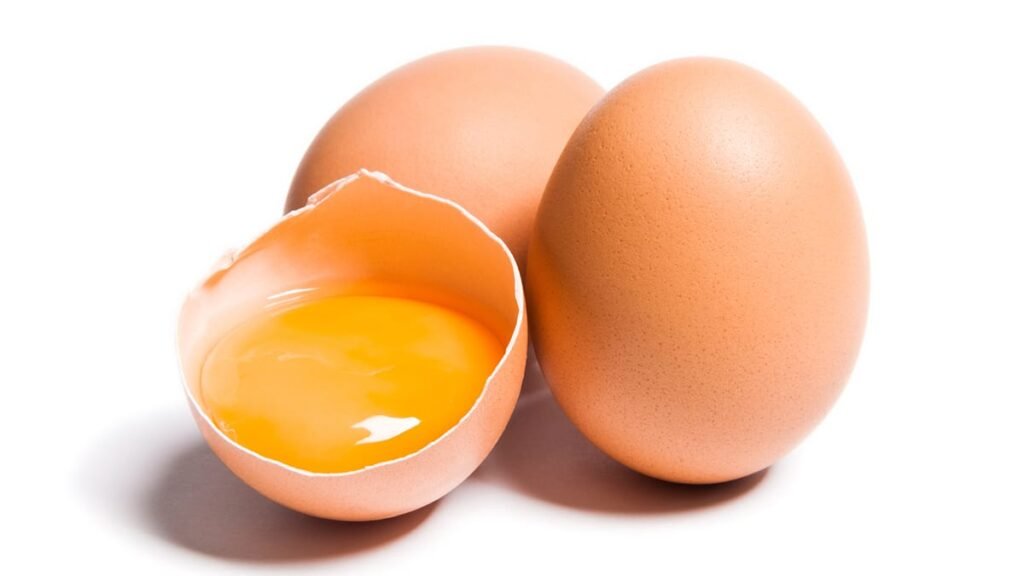Table of Contents
Eggs have long been hailed as a nutritional powerhouse, but there’s more to these humble orbs than meets the eye. In this eye-opening article, we’ll crack open seven lesser-known facts about eggs that will change the way you view this kitchen staple.
From the shocking reality of chicken living conditions to the surprising concentration of nutrients in egg yolks, we’ll explore why eggs truly deserve their place at the top of the health food list. Whether you’re a nutrition enthusiast or simply curious about what’s on your plate, these surprising egg facts are sure to scramble your expectations and leave you with a new appreciation for this incredible food.
Here are 7 key facts:
- Cage Living: 65.9% of US chickens live their entire lives in cages.
- Organic Rarity: Only 5.8% of egg production is organic.
- Vitamin A Powerhouse: Egg yolks are the second-best source of vitamin A after liver.
- Choline Champion: Egg yolks are the highest food source of choline.
- Protein Surprise: Egg yolks have more concentrated protein than egg whites.
- Nutrient Goldmine: Most vitamins and minerals in an egg are found in the yolk.
- Cholesterol Myth: There’s no evidence that eating eggs negatively affects cholesterol levels.
These facts highlight the importance of egg quality, the nutritional benefits of egg yolks, and dispel common misconceptions about eggs and health.
So let’s dive into the details…
Are eggs healthy?

Out of all the healthy things that you could possibly eat, the egg is probably at the top of the list. Today I want to share seven things that I would guarantee most people do not know about eggs. As I go through these items, comment down below on which one is most surprising to you.
Fact 1: The Reality of Chicken Farming
Number one: 65.9% of all chickens in the United States are in cages. They’re not even outside the cage, even inside the barn. They live their whole life in a cage. That’s 65.9% – it’s terrible.
Now out of all the egg and chicken production, only 5.8% are organic.
That’s less than 6%. And unfortunately, they have something called industrial organic, which is still in very large barns.
These poor chickens don’t have hardly any fresh air, they don’t get the chance to go outside, and if they do go outside, it’s on some cement. They don’t even get to touch grass.
- 65.9% of US chickens live in cages
- Only 5.8% of egg production is organic
- “Industrial organic” still limits chickens’ freedom
Fact 2: The Truth About Organic Eggs

So just because something is organic doesn’t necessarily mean it’s the ideal scene. You want organic and pasture-raised.
You really want to know the history of that farm. In fact, there’s a really good website, I’ll put the link down below, it’s called Cornucopia. They have a rating system for eggs so you can actually find out which farms are the best.
- Organic doesn’t always mean ideal conditions
- Look for both organic and pasture-raised eggs
- Cornucopia website offers egg farm ratings
Fact 3: Egg Yolks and Vitamin A

The next point is this: the egg yolk is the second-best source of vitamin A, and I’m talking about the active form of vitamin A called retinol. So the best source is liver, and that also includes cod liver oil.
- Egg yolks are the second-best source of vitamin A (retinol)
- Liver is the best source of vitamin A
Fact 4: Benefits of Vitamin A
Vitamin A is like the anti-dry eye remedy. Vitamin A helps you differentiate in the dim light or the dark.
So as you’re driving and it’s dark out, you’re able to differentiate and see things clearly. If you’re deficient in retinol, everything’s going to be very, very blurry.
Retinol is also the anti-infection nutrient, especially for the outer part of your skin and the inner part of your skin.
That includes the inner part of the mouth, the esophagus, the lungs, as well as the entire digestive system. Vitamin A is intimately involved in the immune system that lines those surfaces.
Vitamin A is important in the conversion of the inactive T4 thyroid hormone to the active T3 thyroid hormone.
Vitamin A can help decrease the risk of melanoma (that’s skin cancer), decrease wrinkles, and that probably has mostly to do with all the incredibly concentrated fat-soluble nutrients in egg yolks.
- Vitamin A aids night vision
- Supports immune system and skin health
- Helps convert thyroid hormones
- May reduce skin cancer risk and wrinkles
Fact 5: Choline in Egg Yolks

All right, next point: the egg yolk is the highest source of choline of any food that you can eat.
What is good about choline? Choline helps prevent a fatty liver. Choline supplies the brain to help make the neurotransmitter acetylcholine.
Choline helps support something called the parasympathetic nervous system, which is responsible for rest and digest.
- Egg yolks are the highest food source of choline
- Choline prevents fatty liver
- Supports brain function and parasympathetic nervous system
Fact 6: Protein Content in Egg Yolks vs. Whites
Now you probably think the egg white has the most concentrated protein compared to the egg yolk. That’s not actually true.
If you look at the protein per 100 grams of that protein and we compare the egg white to the egg yolk, the egg white has 11 grams of protein per 100 grams, and the egg yolk has 17 grams of protein per 100 grams.
Now the caveat about this is that there’s obviously more white than there is yolk, so you’re going to have a little more protein, but that yolk is super concentrated with actually more protein per volume.
- Egg yolks have more concentrated protein than whites
- Yolks: 17g protein per 100g
- Whites: 11g protein per 100g
Fact 7: Nutrient Distribution in Eggs
All right, next point: you may have known this, but I just want to put it out there. The yolk contains the majority of nutrients, okay? Except for two, and I’m talking about vitamins and minerals.
The egg white does have a little bit more B2 and B3, but if we look at all the other minerals, all the other vitamins, it’s in the egg yolk.
It’s funny because sometimes people will, you know, cook up egg whites and throw out the egg yolk. I mean, that’s like you’re throwing out the nutrition.
- Egg yolks contain most vitamins and minerals
- Egg whites only have more B2 and B3
- Discarding yolks means losing most nutrients
Interesting facts about eggs: Cholesterol Concerns
Well, that relates to the next point about this. They might throw away the egg yolk because they don’t want the cholesterol. Well, there is no research that indicates that eating eggs are going to negatively affect your cholesterol in any way, shape, or form.
- No evidence that eggs negatively affect cholesterol levels
Summary
Eggs are one of the most healthy foods in the world. Today, I want to cover the top things many people don’t know about eggs.
Interesting facts about eggs you may have never heard:
- 65.9 percent of all chickens in the US are in cages.
- Less than six percent of egg and chicken production is organic. Organic, pasture-raised eggs and chickens are best.
- Egg yolks are the second best source of the active form of vitamin A, called retinol. Vitamin A has a myriad of health benefits.
- Egg yolks are the best source of choline, which supports the liver, brain, and parasympathetic nervous system.
- Egg yolks are a more concentrated source of protein than egg whites.
- The egg yolk contains the majority of nutrients in the egg.
- There is no research that indicates that eggs will negatively affect your cholesterol.
DATA
Website Link: https://www.cornucopia.org
https://www.ncbi.nlm.nih.gov/pmc/articles/PMC2855261
FAQ
What is the real truth about eggs?
The truth is that eggs are a highly nutritious food that can be part of a healthy diet. While they contain dietary cholesterol, research shows that for most people, eggs do not significantly raise blood cholesterol levels or increase the risk of heart disease[1][4]. Eggs are packed with high-quality protein, vitamins, minerals and antioxidants that provide numerous health benefits[4].
What is so special about eggs?
Eggs are special because they are an inexpensive, versatile and nutrient-dense food. One large egg contains:
- High-quality protein (6 grams)
- All 9 essential amino acids
- Vitamins A, D, E, B12
- Minerals like iron, phosphorus and zinc
- Antioxidants like lutein and zeaxanthin[4]
The nutrients in eggs support strong muscles, brain health, energy production, immune function, heart health, eye health and skin health[4].
Is eating 7 eggs healthy?
Eating 7 eggs per day is likely safe for most healthy adults. However, the optimal number of eggs to consume depends on your overall diet and health status. The 2020-2025 Dietary Guidelines for Americans recommend eating 2-4 eggs per week as part of a healthy eating pattern[4].
If you have a history of heart disease or high cholesterol, it’s best to speak with your doctor about the appropriate number of eggs to include in your diet. Moderation is key, as eating too many eggs could contribute to excess cholesterol intake for some individuals[1].
Is eggs healthy yes or no?
Yes, eggs can be a very healthy part of your diet. They are packed with high-quality protein, vitamins, minerals and antioxidants that provide numerous health benefits[4]. However, it’s important to consume them in moderation as part of an overall balanced diet.
Side effects of eating eggs everyday
For most people, eating eggs every day is safe. However, there are a few potential side effects to be aware of:
- Increased cholesterol levels – Eggs are high in cholesterol, which could raise blood cholesterol levels in some people. However, research shows that for most individuals, dietary cholesterol has a small impact on blood cholesterol[1].
- Salmonella risk – Consuming raw or undercooked eggs carries a small risk of salmonella infection. To reduce this risk, eggs should always be cooked thoroughly until the yolk and white are firm[4].
- Allergic reactions – Eggs are one of the most common food allergens. Those with an egg allergy should avoid consuming eggs[4].
Disadvantages of eating eggs
There are very few disadvantages to eating eggs in moderation as part of a balanced diet. For most people, the benefits of eggs far outweigh any potential risks. However, a few potential downsides to be aware of include:
- High cholesterol content – Eggs are high in cholesterol, which could raise blood cholesterol levels in some people. However, research shows dietary cholesterol has a small impact on blood cholesterol for most individuals[1].
- Salmonella risk – There is a small risk of salmonella infection from consuming raw or undercooked eggs. Proper food safety practices like cooking eggs thoroughly can minimize this risk[4].
- Allergic reactions – Eggs are one of the most common food allergens. Those with an egg allergy should avoid consuming eggs[4].
egg benefits for men
Eggs provide a variety of benefits for men’s health:
- Muscle building and maintenance – The high-quality protein in eggs supports muscle growth and repair[4].
- testosterone production – Eggs contain vitamin D, zinc and cholesterol, which are important for testosterone production[5].
- Heart health – The nutrients in eggs like choline may help reduce heart disease risk factors[4].
- Brain function – Eggs are a good source of choline, which is important for brain health and function[4].
- Eye health – Lutein and zeaxanthin in eggs may help prevent age-related macular degeneration[4].
Why are eggs not good for females
Eggs are generally a very healthy food for women. However, there are a few situations where eggs may not be ideal:
- High cholesterol – Women with high cholesterol or heart disease may need to limit egg consumption, as eggs are high in cholesterol. However, for most women, eggs do not significantly raise blood cholesterol levels[1].
- Gestational diabetes – During pregnancy, women with gestational diabetes may need to limit egg intake, as eggs are high in cholesterol. Speak with your doctor about appropriate egg consumption if you have gestational diabetes[4].
- Egg allergy – Women with an egg allergy should avoid eggs entirely, as they can cause an allergic reaction[4].
Benefits of eating egg for skin
Eggs provide several benefits for skin health:
- Vitamin A – Eggs contain vitamin A, which promotes skin cell growth and repair[2].
- Protein – The high-quality protein in eggs helps maintain skin elasticity and firmness[2].
- Antioxidants – Eggs contain antioxidants like lutein and zeaxanthin that protect skin from sun damage[2].
- Vitamins B2 and B12 – These vitamins in eggs help maintain healthy skin[2].
- Zinc – Eggs are a good source of zinc, which is important for wound healing and skin inflammation[2].
Benefits of eating eggs everyday
Eating eggs every day can provide several health benefits:
- Muscle building and repair – The protein in eggs supports muscle growth and maintenance[4].
- Brain health – Eggs contain choline, which is important for brain function and development[4].
- Eye health – Lutein and zeaxanthin in eggs may prevent age-related macular degeneration[4].
- Heart health – Choline helps break down homocysteine, which may reduce heart disease risk[4].
- Weight management – The protein in eggs promotes feelings of fullness, which may aid in weight loss or maintenance[4].
What happens if I eat eggs for breakfast everyday
Eating eggs for breakfast every day can provide several benefits:
- Increased protein intake – Eggs are an excellent source of high-quality protein, which promotes feelings of fullness and may aid in weight management[4].
- Improved nutrient intake – Eggs contain a variety of vitamins, minerals and antioxidants that support overall health[4].
- Stable blood sugar levels – The protein and fat in eggs can help stabilize blood sugar levels and provide steady energy[4].
- Reduced risk of nutrient deficiencies – Regularly consuming eggs can help ensure adequate intake of nutrients like choline, vitamin B12 and selenium[4].
Are eggs good for your heart
Eggs provide several nutrients that may actually support heart health:
- Choline – Helps break down homocysteine, an amino acid linked to heart disease risk[4].
- Antioxidants – Eggs contain antioxidants like lutein and zeaxanthin that may protect against heart disease[2].
- Protein – High-quality protein from eggs may help maintain a healthy weight, a key factor in heart health[4].




